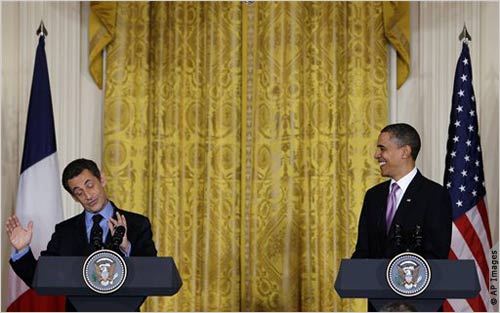French President Nicolas Sarkozy was in Washington today to meet with President Obama and to discuss a range of issues affecting both their countries, such as the global economy and national security. France will assume the presidency of the G-8 and the G-20 in 2011.
After their meeting the two presidents held a joint press conference during which President Obama said they discussed, “how we can coordinate our [G-8 and G-20] agendas to make sure that we are as productive as possible in delivering the kinds of reforms and follow-through that will result in prosperity for peoples around the globe.”
Speaking about Franco-American relations President Obama said: “We don’t have a stronger friend and a stronger ally than Nicolas Sarkozy and the French people. We have cooperated over the last several years on dealing with a global economic crisis, dealing with the challenges of terrorism, dealing with a range of geopolitical issues from the Middle East to Iran to Afghanistan. And I’ve always found Nicolas to be an outstanding partner and an outstanding friend to the American people, as well as a leader on the world stage.”
As the presidents met, so did their wives. Mrs. Obama hosted Mrs. Bruni-Sarkozy for lunch at the White House.





 But in France, the judicial system is designed to prevent this kind of drama. I met a forensic evidence specialist in Lyon who is often called as an expert witness and researcher for criminal trials, and she says that unlike in the United States, most of the work in criminal cases is completed before the trial ever gets underway. Thus, there are few surprises. But there are more important things than pleasing the crowd, right?
But in France, the judicial system is designed to prevent this kind of drama. I met a forensic evidence specialist in Lyon who is often called as an expert witness and researcher for criminal trials, and she says that unlike in the United States, most of the work in criminal cases is completed before the trial ever gets underway. Thus, there are few surprises. But there are more important things than pleasing the crowd, right?